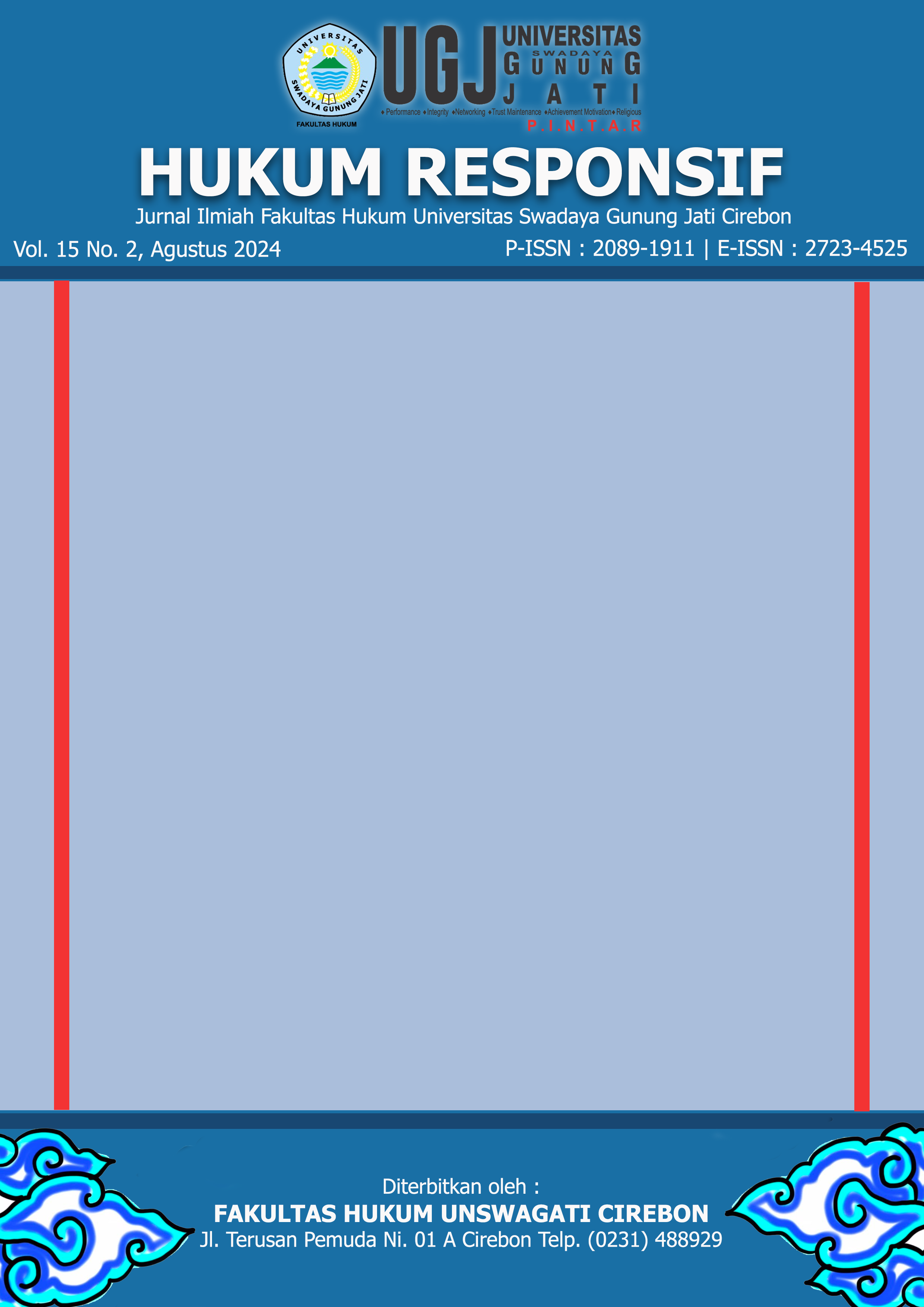APPLICATION OF THE PRINCIPLE OF PROPORTIONALITY IN THE IMPOSITION OF PUNISHMENT AGAINST PERPETRATORS OF CRIMINAL OFFENCES
DOI:
https://doi.org/10.33603/responsif.v15i2.9486Keywords:
Principle of Proportionality, Criminal Offenses, JudgesAbstract
The judge's consideration is an important thing in the imposition of punishment, so it is necessary to conduct a deeper review of the suitability between the amount of punishment and the consideration used by the judge, because the judge's consideration has a major influence on the proportionality of the imposition of punishment and the determination of the severity of the punishment, with this it is hoped that the punishment given has fulfilled a sense of justice for all parties. This study aims to determine the factors considered by the judge in the imposition of punishment and the proportionality of the imposition of punishment in cases of negligence that causes death and injury to others. The research method used is normative juridical which is descriptive (describing) with a research approach in the form of a statute approach and case approach. The result of the research shows that there are several objectives in imposing punishment commensurate with the fault of the perpetrator which considers the same importance between public protection, general prevention and special prevention. However, in the development of discourse on the imposition of punishment, the position of proportionality as a limiting principle is not only followed by the preventive view, but also adopted by the modern retributive variant. This is influenced by different perspectives in viewing the principle of proportionality. From a positive understanding of the principle of proportionality, the court is obliged to impose a punishment that is commensurate with the criminal offence. To that end, the court determines the severity of the punishment to be imposed based on the criminal offence.
References
Andrew von Hirsch & Andrew Ashworth, Proportionate Sentencing: Exploring the Principles, Oxford University Press, New York, 2005, hlm. 17-18
Barda Nawawi Arief, Masalah Penegakan Hukum dan Kebijakan Hukum Pidana dalam Penanggulangan Kejahatan, Cetk. Ketiga, Kencana Prenada Group, Jakarta, 2010, hlm. 2
Basil Ugochukwu, Balancing, Proportionality, and Human Rights Adjudication in Comparative Context: Lessons for Nigeria, York University and Transnational Human rights Review, Vol1, 2014, hlm. 6.
Effendy Mukhtar, Implementasi Teori Pemidanaan dalam Putusan Perkara Psikotropika oleh Hakim Pengadialn Negeri Yogyakarta, Tesis, Magister Ilmu Hukum, Fakultas Hukum Universitas Islam Indonesia, Yogyakarta, 2008, hlm 202 dan 204
Harkrisnowo, Harkristuti. Rekonstruksi Konsep Pemidanaan: Suatu Gugatan Terhadap Proses Legislasi dan Pemidanaan di indonesia, Orasi Pengukuhan Guru Besar di Universitas Indonesia, Depok: 8 Maret 2003.
M. Abdul Kholiq dan Ari Wibowo, Penerapan Teori Tujuan Pemidanaan dalam Perkara Kekerasan terhadap Perempuan: Studi Putusan Hakim, Jurnal Hukum IUS QUIA IUSTUM, 2, 23, 2016, hlm. 195-197 dan 205
Muladi, Kapita Selekta Sistem Peradilan Pidana, Cet.l, Semarang: Badan Penerbit Universitas Diponegoro, 1995.
Vicki C. Jackson, Constitutional Law in an Age of Proportionality, Yale Law Journal, 124, 2015
Downloads
Published
Issue
Section
License
Copyright (c) 2024 Ade Sofyan

This work is licensed under a Creative Commons Attribution-ShareAlike 4.0 International License.
The Authors submitting a manuscript do so on the understanding that if accepted for publication, copyright of the article shall be assigned to Jurnal HUKUM RESPONSIF, Fakultas Hukum Universitas Swadaya Gunung Jati. Universitas Swadaya Gunung Jati as publisher of the journal. Copyright encompasses rights to reproduce and deliver the article in all form and media, including reprints, photographs, microfilms, and any other similar reproductions, as well as translations.
Jurnal HUKUM RESPONSIF, Universitas Swadaya Gunung Jati and the Editors make every effort to ensure that no wrong or misleading data, opinions or statements be published in the journal. In any way, the contents of the articles and advertisements published in Jurnal HUKUM RESPONSIF the sole responsibility of their respective authors and advertisers.














